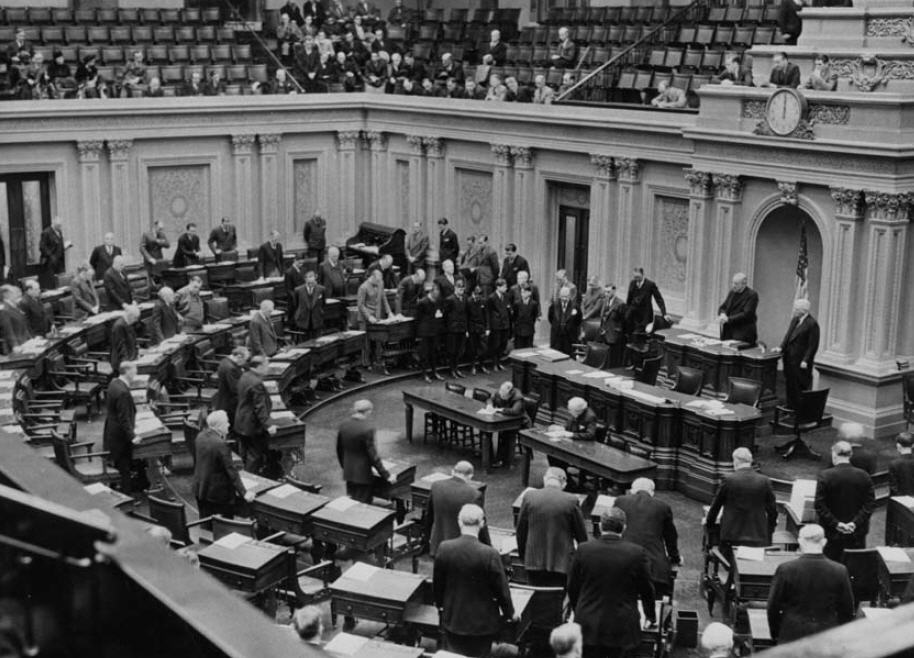On September 7, 1774, the Founding Fathers opened the First Continental Congress in Philadelphia with the prayer “O God of wisdom […]direct the councils of this honorable assembly […]in the name and through the merits of Jesus Christ, Thy Son and our Savior.” On January 25, 2019, before the pledge of allegiance was even uttered, a session of the House of Representatives began with a prayer “unto Him, Christ Jesus our Lord eternal.” In the 245 years between these two legislative meetings, the United States government was built from scratch, the capital of the United States changed cities, and there have been 27 amendments to the United States Constitution. And yet, prayer remains.
The use of prayer in federal government has existed since before the founding of the country and is rooted in many aspects of historical legislative tradition. However, the constitutionality of this conflation of governmental and religious rhetoric was recently debated and defended in the majority opinion of the 2014 Supreme Court Case, Town of Greece v. Galloway. In a 5-4 decision, the court upheld the legality of prayer in all public forums, including the federal government. Prayer was deemed part of U.S. history, a way to solemnize public affairs, and an important tenet of the identities of many citizens. The opinion focused on the universality of religious values, instead of the sectarian nature of the invocations.
Despite the purported secularism of the U.S. government brought forth from the establishment clause of the 1st amendment, Christian prayer is a common practice within legislative bodies, persisting in most state legislatures and in Congress. There are even two Congressional Chaplains — one for each body. The opening prayer is also ingrained in congressional procedure and has been included as part of the official congressional record for the past century. This norm of Christian practices in Congress is neither representative of the religiously heterogeneous American populace nor consistent with the notion of governmental secularity.
The religiosity of the United States stems from the central roles religious leaders have played in affecting political change. Preachers have consistently led social movements, such as those to abolish slavery and for civil rights. However, as much as religion has aided in affecting political change, fighting back against the monopoly of a single religion or an established religion has also been experienced in American history over and over again. Some of the first settlers came to the former British colonies to escape religious persecution, thus underlining the need for the establishment clause. Religious tolerance and a secular government have always been important parts of American history, but as greater diversity is achieved in each lived year of our nation, the necessity to adhere to a true separation of church and state becomes more apparent each day.
Currently, it is estimated that nearly one in four Americans consider themselves to be religiously unaffiliated. That indicates that approximately 75 million Americans identify with no religion. This marks a stark contrast from the demographic religious and racial makeup of the United States in as recent a year as 1976, when a reported 81% of the population identified as White and Christian. Now, only 43% share the same identity. Though the religious composition of the United States has changed, religious traditions in government institutions representing the American people have not. Congressional Chaplains, who make $172,500 annually on federal payroll, have always been Christian men. Out of the 123 Congressional Chaplains employed by the U.S. Government, all but one have been white men.
The strongest examples of religious preference and practice in the government live in the specific words of the prayers that occur before Congress each session. Though these prayers have historically retained their legality, the preference of the government of one religion, or category of religion, is clearly evident in an alarming number of the prayers. In the month of January 2019, every prayer in the House of Representatives referred to a single god. This act alone disregards any non-monotheistic ideologies and atheism. Though the rest of the prayer may contain universal values such as those cited in the Town of Greece v. Galloway court case, the mention of one god should not be lauded as universal, because according to the establishment clause, the government cannot promote any one religion.
Though this act alone should be enough to question the supposed dissociation of religion from the government, many prayers allude to more specific religious sects. On January 22, Father Patrick J. Conroy, the current Chaplain of the House of Representatives, quoted from the Book of Deuteronomy in his invocation. The Book of Deuteronomy is from the Abrahamic tradition. By mentioning it in prayer, Father Conroy limits the scope of his prayer to only acknowledge the faiths that follow this text. This cherry-picking of religious representation in Congress is not only constitutionally questionable, but also an erasure of a significant portion of the American population.
In part of his opinion on Town of Greece v. Galloway, Justice Kennedy disregarded public discomfort with prayer in a governmental setting since “the principal audience for these invocations is not, indeed, the public, but the lawmakers themselves.” This shallow interpretation of legality assumes lawmakers to be of a certain religion themselves, excluding any diversity of belief. Additionally, Kennedy is also close-minded in his assertion, because when the chaplains delivering the prayers are paid with tax dollars, the public very much is the principal audience. Furthermore, both houses of Congress are supposed to mirror the diversity of the American populace, hence the reason those elected hold the title “Representative.” The American people become the principle audience of prayer when an official United States government website affirms the Senate’s “faith in God as Sovereign Lord of our Nation.” The use of prayer in the federal government may not establish what religion this country is, but it is surely establishing what religions it is not.
Photo: “Senate Champlain“
